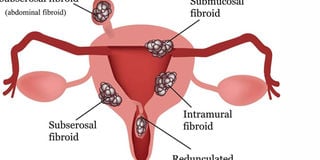Chemicals in plastics, cosmetics stimulate fibroid growth: Study

An illustration showing various types of fibroids. FILE| NATION
What you need to know:
- The new research indicates that women are more likely to develop a symptomatic fibroid if they are exposed to high concentrations of some phthalates such as DEHP (used as a plasticizer to increase the durability of products like shower curtains, car upholstery, lunchboxes and shoes) and its metabolites.
- The study team discovered that exposure to DEHP may trigger a hormonal pathway that leads to the binding of an environmental response receptor to DNA and the development of fibroid tumours.
Common chemicals called phthalates found in everyday consumer products may cause increased growth of fibroids, non-cancerous tumours that grow in a woman’s womb, according to a new study.
The study from Northwestern University has demonstrated a causal link between environmental phthalates (toxic chemicals present in common consumer products) to the growth of uterine fibroids.
Phthalates are a group of chemicals used to make plastic more durable. Some phthalates are used to help dissolve other materials. The chemicals are commonly used by manufacturers in a wide range of products such as such as vinyl flooring, lubricating oils, and personal-care products (soaps, shampoos, hair sprays).
“These toxic pollutants are everywhere, including food packaging, hair and makeup products, and more, and their usage is not banned. These are more than simply environmental pollutants. They can cause specific harm to human tissues,” said corresponding study author, Dr Serdar Bulun, who is also the chair of the obstetrics and gynaecology division at Northwestern University Feinberg School of Medicine. Uterine fibroids affect millions of women world-wide. Symptoms include pelvic and back discomfort, heavy menstrual bleeding, frequent urination and pain during sexual intercourse .
The new research indicates that women are more likely to develop a symptomatic fibroid if they are exposed to high concentrations of some phthalates such as DEHP (used as a plasticizer to increase the durability of products like shower curtains, car upholstery, lunchboxes and shoes) and its metabolites. The study team discovered that exposure to DEHP may trigger a hormonal pathway that leads to the binding of an environmental response receptor (AHR) to DNA and the development of fibroid tumours.
DEHP is the most frequent used phthalate. DEHP, an abbreviation for di(2- ethylhexyl) phthalate, is a manufactured chemical that is commonly added to plastics to make them flexible.
It is still widely used in the United States and other parts of the world for packaging of food and health products, despite growing public concern and some regulatory restrictions in EU member states.
Consumer products can slowly release DEHP into indoor settings like homes, offices, schools, and daycare centers.
It can settle on floors and other surfaces, absorbing airborne particles and dust. During pregnancy, DEHP can be passed from the mother to the fetus.





